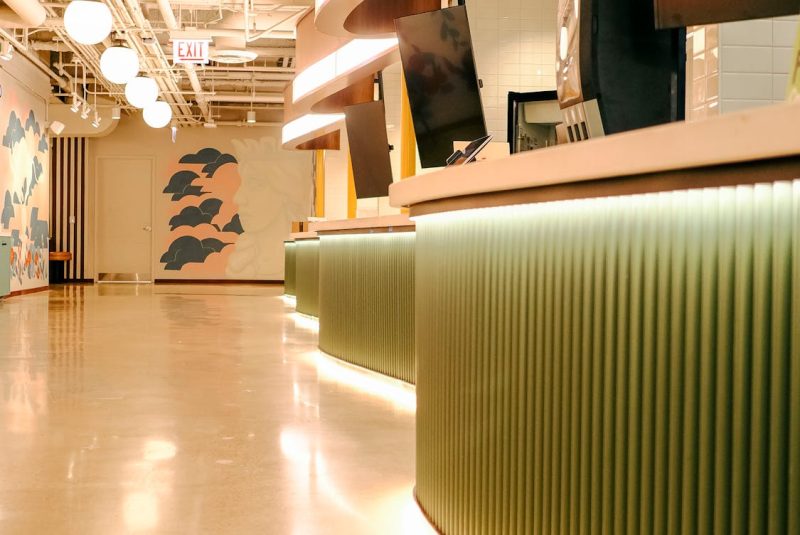Choosing the right epoxy flooring for your business is a key decision that can impact not just the aesthetics of your space, but also its functionality and safety.
With a plethora of options available on the market, making the right choice can feel overwhelming. However, breaking down the selection process into manageable steps can help you arrive at a choice that aligns with your business needs.
Understanding the Basics of Epoxy Flooring
Epoxy flooring is a combination of resin and hardener that, when mixed, forms a solid surface. This flooring is commonly used in commercial settings due to its durability and resistance to various elements.
Whether you run a warehouse, retail space, or an industrial facility, epoxy flooring can provide significant advantages.
For projects requiring both durability and design flexibility, seamless commercial and residential coatings are an excellent solution that delivers long-term performance. It resists stains, heavy foot traffic, and impacts, making it a wise choice for many business types.
Assessing Your Business Environment
Before selecting an epoxy flooring system, consider the specific environment of your business. For instance, do you expect high foot traffic? Are there heavy machinery or vehicles involved? Is there a risk of spills from chemicals or oils?
Knowing the demands of your environment will help narrow down your options. A food processing facility, for example, requires a different type of epoxy than a showroom.
Identifying the Different Types of Epoxy Flooring
There are several types of epoxy flooring available, each suited for different applications. Here are a few popular types:
Self-Leveling Epoxy: This type is ideal for creating a smooth, even surface and is often used in environments where aesthetics matter, such as retail spaces.
Epoxy Mortar: Known for its high durability, this type is perfect for areas that need to withstand heavy impacts and chemical spills.
Flake Epoxy: This decorative option blends colored flakes into the epoxy for a stylish finish. It’s commonly used in garages and showrooms.
Conductive Epoxy: Used in environments where static electricity can be a concern, conductive epoxy helps mitigate risks associated with electronic components.
Evaluating your business’s specific requirements will guide you in selecting the most suitable epoxy type.
Evaluating Aesthetic Preferences
The appearance of your flooring might play a significant role in your decision-making process. Epoxy flooring comes in a variety of colors and finishes, allowing for customization to match your brand’s identity. Do you want a sleek, modern look, or would you prefer something more traditional?
Consider how the flooring will blend with your existing decor and whether you want to incorporate logos or patterns. Having a well-thought-out aesthetic can enhance the overall appeal of your business and make a lasting impression on customers.
Considering Maintenance and Cleanup
Maintenance needs can greatly influence your choice of epoxy flooring. Some types require more upkeep than others. For instance, flake epoxy might need periodic resealing to maintain its appearance, whereas self-leveling epoxy typically demands less.
Think about how much time and resources you can allocate for maintenance. If your business operates in a high-traffic area where spills and dirt are common, a flooring system that is easy to clean and maintain will be beneficial.
Budgeting for Epoxy Flooring
Finances play a pivotal role in decision-making. Epoxy flooring can range widely in price based on the type, application method, and the intricacies of the design. A simple self-leveling coating might be less expensive than a decorative flake system.
Look beyond the initial installation cost; consider the long-term value. A durable flooring choice can save you money on repairs and replacements down the line.
Get multiple quotes from suppliers and contractors to find a solution that fits both your aesthetic needs and your budget.
Engaging Professional Installers
Installing epoxy flooring is not a simple DIY project. It requires an understanding of the material, proper tools, and expertise. Engaging professionals for installation can ensure that the flooring is laid correctly, maximizing its lifespan and performance.
Seek recommendations or read reviews of contractors who specialize in epoxy flooring. It’s wise to ask potential installers about their experience, past projects, and warranties.
Choosing a reputable contractor can mean the difference between a seamless finish and a headache of repairs later on.
Understanding Local Regulations and Safety Standards

Depending on your location, there may be regulations and safety standards that govern the type of flooring suitable for your business. Certain industries may have strict guidelines regarding slip-resistance, cleanliness, and safety.
Consult local building codes or industry regulations to ensure your chosen flooring meets all necessary requirements. Failing to comply can lead to fines or, worse, liability issues if an accident occurs.
Evaluating Durability and Longevity
Durability is one of the main attractions of epoxy flooring. However, not all epoxies are created equal. Some formulations are designed to withstand heavy loads and extreme conditions, while others may be more suitable for light traffic areas.
Research the lifespan of different epoxy systems and what factors can affect it. Environmental conditions, such as humidity and temperature, can also play a role in how long your flooring lasts.
Selecting a Slip-Resistant Finish
Safety should be a top priority when selecting flooring. Slip-resistant finishes are essential, especially in areas prone to spills or moisture. Many epoxy flooring options come with additives that enhance grip and reduce the likelihood of slips and falls.
Be proactive about creating a safe environment for both employees and customers. This not only minimizes accidents but also demonstrates a commitment to workplace safety.
The Importance of Warranty and Support
When investing in epoxy flooring, look for products that come with a solid warranty. A comprehensive warranty can provide peace of mind, protecting your investment against defects and premature wear.
Inquire about the support services available from the manufacturer or installer. Should issues arise, having access to reliable customer service can alleviate headaches and ensure your flooring remains in top shape.
Exploring Color and Design Options
With a variety of colors and designs available, you have the freedom to customize your epoxy flooring to fit your brand personality. Bright colors can energize a workspace, while muted tones may promote a more professional atmosphere.
Don’t forget about the practical aspects of color selection. Lighter colors can show dirt more easily, which might increase cleaning frequency. Weigh the aesthetic benefits against practical maintenance needs when making your choice.
Planning for Future Needs
As your business evolves, your flooring needs may change. Think ahead about potential expansions or modifications. Investing in a flexible flooring solution that can adapt to future requirements can save you time and money in the long run.
Consider whether the flooring can accommodate different settings or traffic patterns down the line. A flooring option that allows for easy modifications can be a game-changer when adapting to changing business demands.
Choosing the right epoxy flooring requires a thoughtful approach, balancing aesthetics, functionality, and safety. By taking the time to evaluate your options, you can find a flooring solution that meets your business’s needs while enhancing its overall appeal.









